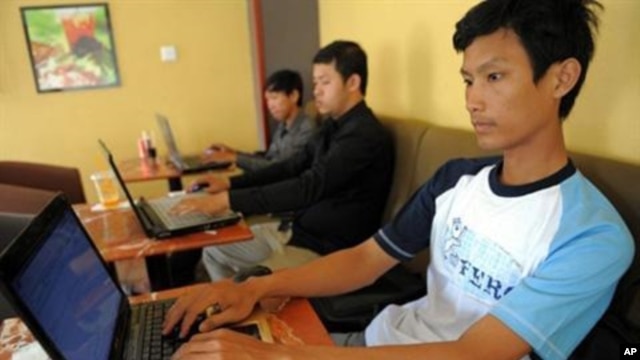With the increased used of social media, consumers in this new generation can access media anywhere, any time, through laptops and smartphones.
25 December 2012
Washington--Changes in demography and technology have altered the
behavior of Cambodian media consumers, with youth increasingly using
social media platforms to share news and information.
Pen Sophal, a graduate student in media management at Sweden’s Royal
Institute of Technology, says print and electronic media outlets in
Cambodia must now find new ways to deliver content.
Cambodians aged 35 or younger are the majority of the population, he told “New Voices” in an interview.
“They have posed a new demand for media content and accessibility,” he
said. “Media consumers of this technology era don’t have the patience to
wait for the content that traditional media outlets schedule to deliver
at a certain time.”
With the increased used of social media, consumers in this new
generation can access media anywhere, any time, through laptops and
smartphones. They participate and engage in information sharing and
actively give feedback and comments in real time. They can even help
traditional media by becoming citizen journalists, he said.
Internet penetration, meanwhile, continues to increase, from about 1
percent a few years ago to 5 percent today. Mobile phone subscribers
continue to increase, and today nearly 100 percent of the population has
a mobile phone. About 40 percent of those users have a type of
smartphone, he said.
“The number of smartphone users is increasing dramatically,” Pen Sophal
said. “They then can use social media as a platform to engage in all
sorts of issues in real time from anywhere.”
Social media provides a type of communication that is different from
traditional media, he said. This fosters the type of debate that
traditional media struggle with, he said.
Traditional media is also heavily influenced by the government, while
social media users enjoy complete freedom of information, a positive
trend that he said he hopes will continue. And while it is difficult to
predict the future, it appears that the behavior of media consumers
continues to change in the climate of global new media.
“We have to change our mindset,” Pen Sophal said. “This is a young
generation. They need new tastes. We cannot cook using the same
ingredients and recipe for those who want a different taste.”
And social media can be very influential, he said, touching on issues
of social justice that are not often found in local traditional media.
For example, when a monk was arrested during a demonstration over the
land dispute in Phnom Penh’s Boeung Kak area, news did not appear in
local media. However, the news “was viral on Facebook, which put
pressure on traditional media to pick it up and broadcast or publish
it,” Pen Sophal said. “If they hadn’t broadcast it, they would have
missed an important piece of news that was known internationally.”
In addition, social media users are able to fact check the news coming
from traditional media, which can lack independence or competence. This
can include statements by public figures, including the prime minister,
he said.


No comments:
Post a Comment